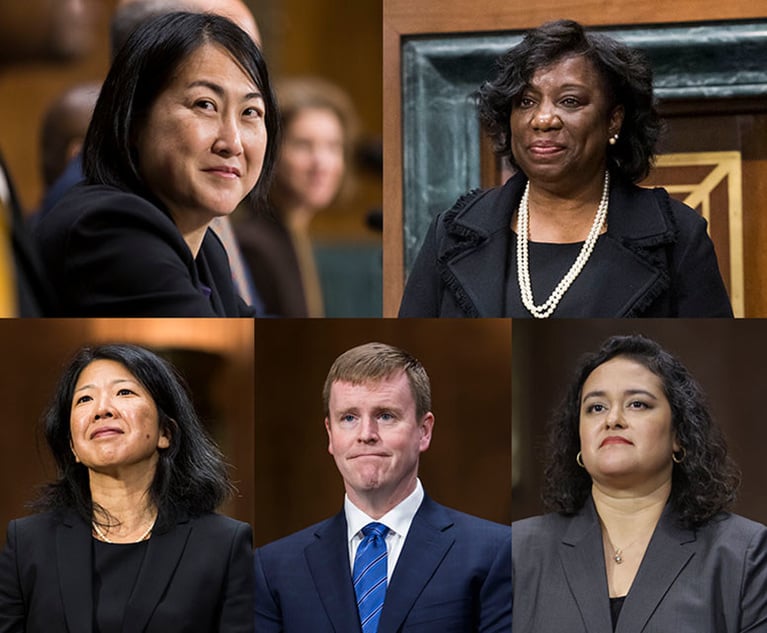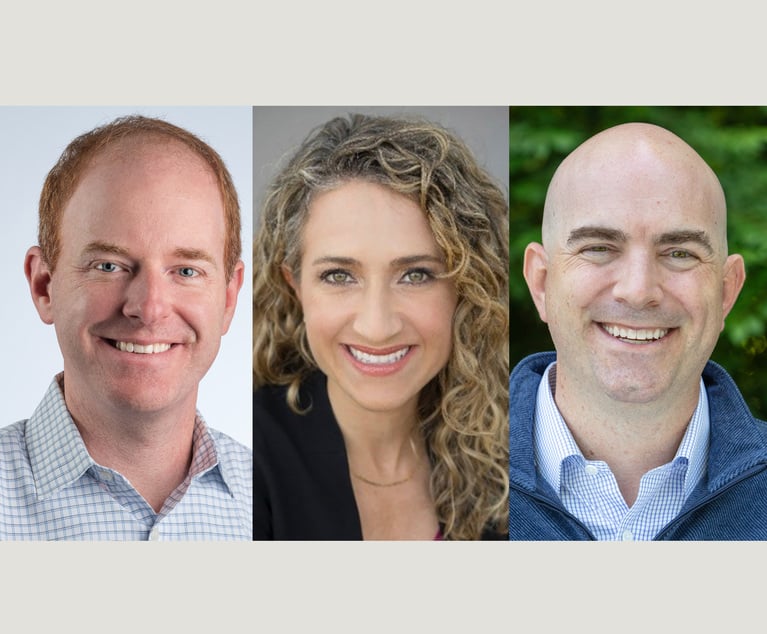Racist Rant, Other Events Show Social Media's Power Over Lawyers
A racist rant. Scrutiny over prolific billable hours. Controversy over arbitration pacts. All three have made news in the legal world in the past few months, and all were thrust into the spotlight through social media.
May 21, 2018 at 03:54 PM
5 minute read
The original version of this story was published on The American Lawyer
 Photo by Vasin Lee/Shutterstock.com
Photo by Vasin Lee/Shutterstock.com
The legal world has seen three separate incidents in the past two months that demonstrate the power of social media and the specific risks, ranging from potential ethics violations and disciplinary issues to reputational concerns and scrutiny of business practices, that lawyers and firms face in the digital age.
Last week, a New York-based lawyer named Aaron Schlossberg was at the center of a social media backlash after he was caught on video in the midst of a racially charged rant that included complaining about restaurant employees at a Manhattan lunch spot speaking Spanish and threatening to call federal immigration authorities.
That viral video episode came after a Michigan intellectual property lawyer at Howard & Howard, highlighted in an ALM article for billing some 3,600 hours in 2017, caught flack from Twitter commentators who saw the story as a sign of what's wrong with the legal profession. And before that, the law firm Munger, Tolles & Olson in late March got caught in the middle of a social media-fueled controversy over a requirement that summer associates sign agreements to arbitrate sexual harassment claims.
None of the situations has resulted in any sort of disciplinary or ethical action being taken against the lawyers or their firms. That's true even of Schlossberg, although an online petition, backed by more than 44,000 people as of mid-afternoon Monday, and a U.S. congressman, have attempted to change that by calling for a New York attorney grievance committee to review his actions and consider imposing discipline.
Disciplinary issues aside, each case is a clear example of social media exerting its influence over the legal industry.
“Like it or not, whether they actively use social media or not, lawyers need to be aware of social media and other online tools that can be used to disseminate information about them—both good and bad—quickly and efficiently,” said Allison Shields, president of Legal Ease Consulting Inc., who consults lawyers and firms on social media issues.
Among other forms of outcry over his racist remarks, Schlossberg's ratings on business review websites such as Yelp are in the gutter. After the video of him went viral, he was also forced into what appeared to be uncomfortable run-ins with members of the press and has been subjected to unusual forms of protest.
Meanwhile Dan Bliss, the Howard & Howard lawyer with prolific billable hours in 2017, had to defend his practices to an ALM reporter after a slew of Twitter comments, and admitted that his work ethic had sometimes interfered with his family life. Munger Tolles, the firm caught up in the summer associate arbitration agreement controversy, quickly reversed course, issuing a conciliatory statement on Twitter indicating that it would abandon the arbitration pacts.
Shields, who practiced law before becoming a legal consultant, said she thought it unlikely that someone in Schlossberg's position would end up facing a disciplinary action. Although New York's rules of professional conduct do include a prohibition on conduct that “adversely reflects on the lawyer's fitness,” she said that “without more, racist comments and threats to contact ICE as a private citizen may not suffice.”
However, Shields did see the Schlossberg situation as a cautionary tale. It is a clear example of the reputational risks that can arise in the social media era, she said.
“Even absent the ethical rules, lawyers need to understand that their reputation is their most valuable asset,” she said. “It may take a long time to build an excellent reputation as a lawyer, but it takes only a moment to lose it.”
Schlossberg's comments and actions, while repugnant, may not rise to the level of disciplinary action, she said. But because those comments were captured and broadcast on social media, they certainly did damage to his reputation.
Shields also noted a specific set of considerations related to online marketing by lawyers or their firms. Any lawyer who uses a social media account to try to attract clients or promote themselves or their firms, she said, should keep in mind that those actions would likely be subject to the same ethical rules regarding legal advertising.
In light of those risks, Shields said she advises people to think about what they post on social media, or what they do and say in public—as if those words or actions will be broadcast on television or printed on the front page of a newspaper.
“Even with privacy controls in place or limiting access to social media accounts and posts to 'friends,' anything posted online is potentially public,” she said. “If lawyers are using social media themselves, they need to be hyper-aware of what they are saying, when, and to whom, even if they are posting on private pages as individuals, and even when their posts aren't related to or commenting on their law practice, if only for purposes of preserving their reputation.”
This content has been archived. It is available through our partners, LexisNexis® and Bloomberg Law.
To view this content, please continue to their sites.
Not a Lexis Subscriber?
Subscribe Now
Not a Bloomberg Law Subscriber?
Subscribe Now
NOT FOR REPRINT
© 2025 ALM Global, LLC, All Rights Reserved. Request academic re-use from www.copyright.com. All other uses, submit a request to [email protected]. For more information visit Asset & Logo Licensing.
You Might Like
View All
Tips From—and About—the New Judges on the Northern District of California Bench

Will Trump Be a Boost to Quinn Emanuel's Fortunes in China?
Trending Stories
- 1DC's Birchstone Moore Combines With Chicago-Founded Wealth Planning Firm
- 2White Castle GC Becomes Chain's First President From Outside Family
- 3Braverman Greenspun Acquires NY Real Estate Boutique
- 4Winston & Strawn Snags Sidley Austin Cross-Border Transactions Partner in Miami
- 5U.S. Attorney Markenzy Lapointe Stepped Down
Who Got The Work
Michael G. Bongiorno, Andrew Scott Dulberg and Elizabeth E. Driscoll from Wilmer Cutler Pickering Hale and Dorr have stepped in to represent Symbotic Inc., an A.I.-enabled technology platform that focuses on increasing supply chain efficiency, and other defendants in a pending shareholder derivative lawsuit. The case, filed Oct. 2 in Massachusetts District Court by the Brown Law Firm on behalf of Stephen Austen, accuses certain officers and directors of misleading investors in regard to Symbotic's potential for margin growth by failing to disclose that the company was not equipped to timely deploy its systems or manage expenses through project delays. The case, assigned to U.S. District Judge Nathaniel M. Gorton, is 1:24-cv-12522, Austen v. Cohen et al.
Who Got The Work
Edmund Polubinski and Marie Killmond of Davis Polk & Wardwell have entered appearances for data platform software development company MongoDB and other defendants in a pending shareholder derivative lawsuit. The action, filed Oct. 7 in New York Southern District Court by the Brown Law Firm, accuses the company's directors and/or officers of falsely expressing confidence in the company’s restructuring of its sales incentive plan and downplaying the severity of decreases in its upfront commitments. The case is 1:24-cv-07594, Roy v. Ittycheria et al.
Who Got The Work
Amy O. Bruchs and Kurt F. Ellison of Michael Best & Friedrich have entered appearances for Epic Systems Corp. in a pending employment discrimination lawsuit. The suit was filed Sept. 7 in Wisconsin Western District Court by Levine Eisberner LLC and Siri & Glimstad on behalf of a project manager who claims that he was wrongfully terminated after applying for a religious exemption to the defendant's COVID-19 vaccine mandate. The case, assigned to U.S. Magistrate Judge Anita Marie Boor, is 3:24-cv-00630, Secker, Nathan v. Epic Systems Corporation.
Who Got The Work
David X. Sullivan, Thomas J. Finn and Gregory A. Hall from McCarter & English have entered appearances for Sunrun Installation Services in a pending civil rights lawsuit. The complaint was filed Sept. 4 in Connecticut District Court by attorney Robert M. Berke on behalf of former employee George Edward Steins, who was arrested and charged with employing an unregistered home improvement salesperson. The complaint alleges that had Sunrun informed the Connecticut Department of Consumer Protection that the plaintiff's employment had ended in 2017 and that he no longer held Sunrun's home improvement contractor license, he would not have been hit with charges, which were dismissed in May 2024. The case, assigned to U.S. District Judge Jeffrey A. Meyer, is 3:24-cv-01423, Steins v. Sunrun, Inc. et al.
Who Got The Work
Greenberg Traurig shareholder Joshua L. Raskin has entered an appearance for boohoo.com UK Ltd. in a pending patent infringement lawsuit. The suit, filed Sept. 3 in Texas Eastern District Court by Rozier Hardt McDonough on behalf of Alto Dynamics, asserts five patents related to an online shopping platform. The case, assigned to U.S. District Judge Rodney Gilstrap, is 2:24-cv-00719, Alto Dynamics, LLC v. boohoo.com UK Limited.
Featured Firms
Law Offices of Gary Martin Hays & Associates, P.C.
(470) 294-1674
Law Offices of Mark E. Salomone
(857) 444-6468
Smith & Hassler
(713) 739-1250








